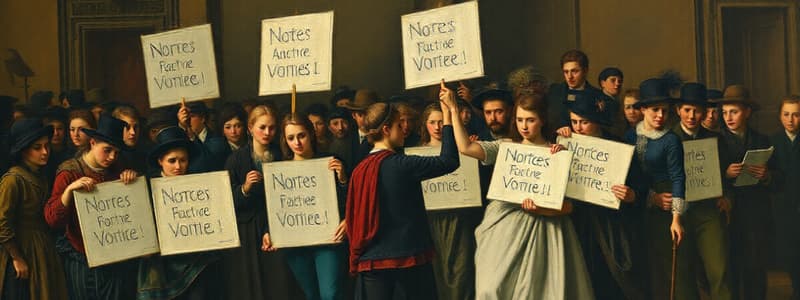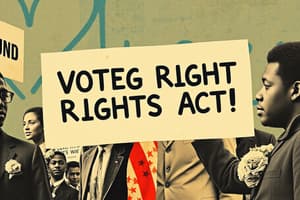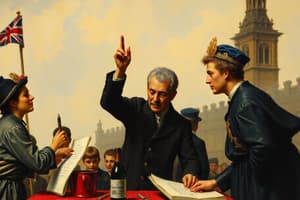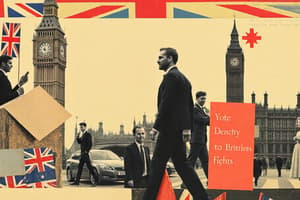Podcast
Questions and Answers
What types of sources do historians use?
What types of sources do historians use?
Primary and secondary sources
Why were people in Britain unhappy by 1816?
Why were people in Britain unhappy by 1816?
The political system had not changed, leading to little say in how the country was run, and problems after the Napoleonic Wars.
How were people showing their unhappiness in 1816 and 1817?
How were people showing their unhappiness in 1816 and 1817?
Through reform societies that wanted men to be given the vote and general public discontent.
What were the causes of the Peterloo massacre?
What were the causes of the Peterloo massacre?
What reasons did people producing interpretations want the film 'Peterloo' to achieve? (Select all that apply)
What reasons did people producing interpretations want the film 'Peterloo' to achieve? (Select all that apply)
What impact did the Great Reform Act of 1832 have on Britain?
What impact did the Great Reform Act of 1832 have on Britain?
What did the Chartists achieve?
What did the Chartists achieve?
Who could vote as 1900 approached?
Who could vote as 1900 approached?
What is the process of industrialisation?
What is the process of industrialisation?
What is a rotten borough?
What is a rotten borough?
What does disenfranchise mean?
What does disenfranchise mean?
Flashcards are hidden until you start studying
Study Notes
The Historical Process
- Historians use primary and secondary sources to reach interpretations about the past.
The Right to Vote in Britain
- Before the 19th Century, people in Britain had very little say in how the country was run.
- The Napoleonic Wars led to widespread discontent in Britain due to recession and unemployment.
- People in England were unhappy with the corruption of the political system.
- The Great Reform Act of 1832 expanded the right to vote to the middle classes.
- By 1900, almost 60% of men could vote but women were still disenfranchised.
Peterloo Massacre
- In 1819, 80,000 people gathered at St Peter’s Field to hear Orator Hunt speak.
- The magistrates panicked and sent in the yeomanry, leading to 18 deaths and 700 injured.
- This event highlighted the need for reform.
The Chartists
- The Chartists campaigned for fair and free elections through the People’s Charter.
- The Chartists demanded representation for all working-class men.
- Chartists were divided into two groups: moral force and physical force.
- The Chartists failed to achieve any of their goals by 1848.
- They were successful in the long run, as many of their demands were eventually met.
Historical Interpretation and Representation
- Historians make choices when representing their research to entertain, inform, educate, and thrill.
- The film 'Peterloo' aims to represent the historical event.
Key Terms
- Constituency: an area represented by an elected member of Parliament.
- Rotten Boroughs: small towns with few residents, corruptly representing large numbers of people in Parliament.
- Recession: a period of economic decline.
- Radical Reformers: Those seeking large changes to the political system.
- Petition: A document signed by a large group asking for change.
- Franchise: The right to vote.
- Disenfranchise: To be denied the right to vote.
Studying That Suits You
Use AI to generate personalized quizzes and flashcards to suit your learning preferences.




